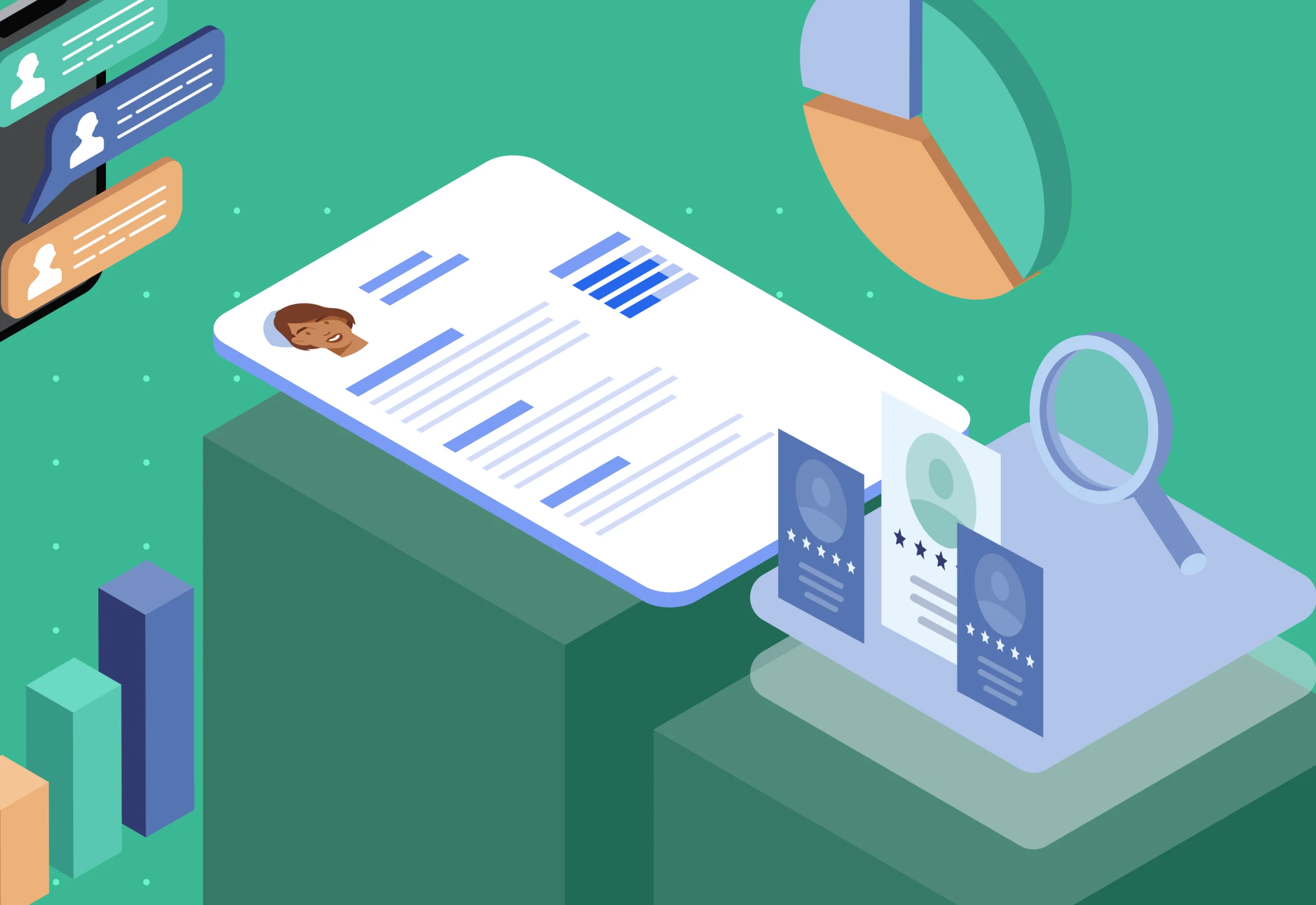The job market is getting increasingly competitive, which is why it's more important than ever to show recruiters and potential employers what you can do in an effective way. One valuable skill set that can make you stand out among the competition is your analytical skills.
These skills are in high demand in many industries, especially if you’re into data analysis, business, finance, or market research.
In this article, we’ll explore:
What analytical skills are
How to demonstrate analytical skills on your resume
How to improve your analytical skills to increase your chances of landing a dream job
Let’s get started!
Key Takeaways
Analytical skills refer to your ability to collect, process, and interpret data. This helps you make decisions, solve problems, and obtain positive results in your personal life and professional career.
These skills are some of the most sought-after ones in today’s business climate. They are relevant in many industries and associated with various other abilities, implying that a candidate has a diverse and valuable skill set.
You should demonstrate your analytical skills in your resume summary, objective, work experience, education, and optional sections in addition to simply listing them in the skills section.
There are many ways to improve your analytical skills, ranging from teaching someone about the topics you’re knowledgeable about and reading complex literature to playing logic games and solving puzzles.
What Are Analytical Skills?

You can pretty much deduce the meaning of analytical skills from their name. They represent your ability to gather, process, and interpret information. In turn, that allows you to break down complex information into smaller, much more manageable parts. By doing that, you’re able to draw conclusions and make effective, informed decisions.
People with strong analytical skills can identify trends and patterns, which can be rather important in certain fields and positions.
All of that makes analytical skills the foundation for both problem-solving and decision-making skills. They are crucial in today’s fast-paced professional environment. Being able to solve complex problems and make important decisions in a data-driven world can result in success both in your personal life and career.
For example, if you’re in the field of finance, analytical skills can help you analyze data and trends before investing. On the other hand, these skills can also be useful in marketing to help you study how customers behave, and these are just some of the numerous examples out there.
Why Are Analytical Skills Important For Your Resume?

As many as 2.7 million job ads listed analytical thinking as one of the requirements in 2022 alone. Therefore, it’s no wonder analytical skills are among the most in-demand soft skills, next to communication and time management. That alone is one of the crucial reasons why you want to include these abilities in your resume.
The benefits of analytical skills are multifaceted. Due to their transferable nature and relation to other abilities, this single piece of information indicates that you possess a diverse set of traits and abilities useful in the workplace.
Furthermore, analytical skills are relevant to many different industries. We briefly touched upon their usefulness in business, finance, or marketing. However, they can make you a more attractive candidate regardless of your career or the position that you’re applying for.
In essence, including analytical skills in your resume also demonstrates your ability to think critically, solve complex problems, and make data-driven decisions. They can increase your chances of being considered for a wider range of positions and set you apart from the competition.
How to Add Analytical Skills to Your Resume

Now that we know the importance of having analytical skills on your resume, let’s find out how to best add them.
For starters, you shouldn't just list "analytical skills" on your resume and call it a day—you must also show them off with real-world examples.
Talk about how you used these skills in past jobs and showcase the exact results obtained. Some of the best sections for that are your resume summary or objective, work experience section, education section, and some of the optional sections, such as the “Accomplishments” or “Training” sections.
One of the best ways to make those examples stand out is to use the right keywords. When listing achievements from your previous roles, you could include phrases such as “decision-making,” “problem-solving,” “trend analysis," “data analysis,” and more. As a result, recruiters who are specifically looking for your analytical skills are bound to notice these terms.
Another way to highlight your analytical prowess is to include your proficiency in relevant software. For example, you could add experience using software such as Microsoft Excel or Tableau to demonstrate your ability to analyze, interpret, and transform data.
Lastly, you can always highlight certifications or coursework related to data analysis and problem-solving. They add credibility to your analytical skills while also showing your desire to learn and improve.
9 Analytical Skills To Include in Your Resume

Let’s put all this theoretical knowledge into practice and see which analytical skills you can include in your resume depending on your career choice.
#1. Analysis
Here are some crucial, job-specific analytical skills to include if you’re applying for a position of an analyst:
Financial analysis
Market analysis
Customer analysis
Competitive analysis
Operations analysis
Risk analysis
Sales analysis
Supply chain analysis
SWOT analysis
Analysis Skills Examples
Now let’s see how to include them in your resume:
Conducted an in-depth financial analysis to identify cost savings opportunities and reduce 7% in operating expenses
Spearheaded the launch of a new product line that generated $1.5 million in revenue by conducting market research and analysis
#2. Data
As a data-oriented specialist, you could include some of the following analytical skills in your resume:
Data analysis
Data visualization
Data modeling
Data mining
Data warehousing
Data engineering
Machine learning
Business intelligence
Data Skills Examples
Here are some examples:
Visualized data with interactive dashboards to assist stakeholders and improve their decision-making time by 25%
Created a large-scale data warehousing structure to enhance processing times by 55%
#3. Creativity
If your role requires a certain dose of creativity, you could highlight some of these analytical skills:
Concept development
Trend analysis
Design analysis
User research
Market research
Consumer insight
Brainstorming
Brand analysis
Creativity Skills Examples
Here’s how you could add them to your resume:
Developed a new concept product based on market research that resulted in a 37% sales increase after its launch
Conducted a design analysis on one of the current products to find areas of improvement, resulting in a 19% increase in customer satisfaction
#4. Research
There are many skills that require analytical prowess in research-oriented careers. Here are some of the key ones:
Data collection
Data analysis
Literature review
Experiment design
Model development
Communication
Problem-solving
Critical thinking
Research Skills Examples
And here’s what those skills look like when put into practice on your resume:
Designed a series of experiments to compare different marketing strategies and identify the most effective methods
Conceptualized a predictive model using machine learning to anticipate customer behavior, helping management and stakeholders make informed decisions with greater accuracy
#5. Finance
Analytical skills in finance are often some of the most important ones. Here are some of the most commonly used ones:
Financial modeling
Financial analysis
Portfolio management
Data analysis
Budgeting
Forecasting
Risk assessment
Investment analysis
Capital budgeting
Finance Skills Examples
These examples will show you how to demonstrate them on your resume:
Achieved a 5% increase in budget accuracy by developing an accurate financial model of future revenue and expenses
Managed a $35 million investment portfolio, achieving a 9% ROI
#6. Management
If you work in the management field, these analytical skills can help you stand out:
Strategic planning
Process improvement
Cost-benefit analysis
Resource allocation analysis
Performance analysis
Risk assessment
Trend analysis
Operations analysis
KPI analysis
Competition analysis
Management Skills Examples
Here are some examples of how you can add these skills to your resume:
Identified inefficiencies through process analysis and implemented solutions to boost productivity by 11%
Conducted long-term performance analysis on an individual and team level, resulting in a 17% increase in overall output
#7. Communication
Here are some analytical skills that can help you communicate and convey information optimally:
Message analysis
Audience analysis
Content analysis
Presentation skills
Reporting
Storytelling
Persuasion
Communication Skills Examples
Let’s see how you could highlight these skills on your resume:
Created concise and effective visual presentations to increase audience engagement and understanding by 35%
Conducted audience analysis to adjust customer service communication, resulting in a 13% customer satisfaction increase
#8. Critical Thinking
Consider some of the following analytical skills if you want to show your ability to think critically:
Decision making
Root cause analysis
Logical reasoning
Trend analysis
Cost-benefit analysis
Risk assessment
Creative thinking
Systems thinking
Critical Thinking Skills Examples
Check out the examples to see how to demonstrate these skills in your resume:
Conducted a root cause analysis to identify underlying issues and decrease customer complaints by up to 35%
Performed risk assessment and created contingency plans to decrease the project failure rate by 17%
#9. Attention to detail
These analytical skills can help you emphasize your attention to detail:
Quality assurance
Data accuracy
Process improvement
Record keeping
Report writing
Performance monitoring
Attention to Detail Examples
And here’s how you could add them to your resume:
Identified small-scale but critical details in production processes that led to a 15% improvement in overall efficiency
Verified data accuracy to achieve a 99% error-free rate
How to Improve Your Analytical Skills

Improving analytical skills can be a lifelong process, and you can only get better with constant work and training. The good thing is that some methods can be rather easy and even fun.
So, whether you’re trying to develop analytical skills from scratch or you’re a seasoned veteran looking to improve them further, we’ve prepared a list of handy tips to help you out:
Expert Tips
Try to teach someone. It doesn’t have to be anything related to analysis. Teaching implies that you already possess thorough knowledge of the subject and that you’re able to split complex information into smaller, easy-to-digest bits. A teacher can point out patterns, use analogies, understand other people’s perspectives, and more.
You should always look to expand your knowledge. You can achieve that by staying up-to-date with the latest technologies and practices, reading books, attending courses, participating in workshops, and more. Additionally, you could take tests to simultaneously evaluate your current proficiency and practice further.
Practice reading comprehensionwith complex literature. That way, you’ll gain deeper knowledge on various subjects but also train yourself to analyze different opinions, draw conclusions from seemingly unrelated bits of information, and develop critical thinking skills.
Work on improving your structured approach. Being able to analyze large tasks and difficult challenges and break them down into smaller parts can help you make decisions more easily.
Refine your attention to detail. By finding and correcting small errors, you’ll improve not only your analytical skills but also your focus and mindfulness.
Don’t be afraid to ask questions. If you ever feel stuck or need clarification, feel free to ask someone to help you better understand complex information.
Lastly, you can practice problem-solvingby playing logic games, puzzles, brain teasers, and riddles. Anything from chess and sudoku to challenging video games can make you better at analyzing.
Closing Thoughts
Whether your role revolves around conducting performance analysis, visualizing data to convey information, or demonstrating attention to detail, carefully selected analytical skills on your resume can help you stand out.
Also, you should remember that knowing which skills to add to your resume is just half the battle. That’s why we’ve shown you some of the best ways to add them to your job application. Plus, we gave you real-world examples that you could use both as lessons and as inspiration.
By following the guidelines in this article, you’ll be able to effectively demonstrate career-specific analytical skills on your resume. That could help you apply for a wide range of roles and maybe even land the job of your dreams.


